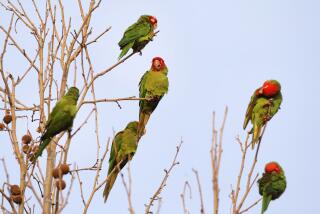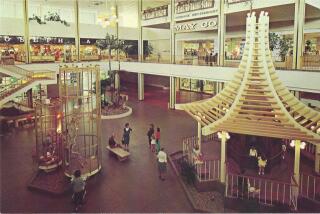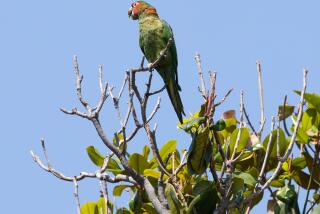Vultures Take Liking to Trees in Mall Lot : Thousand Oaks: The scavenger birds roost in branches of eucalyptuses at The Oaks and Chamber of Commerce.
- Share via
They have small heads, large wings and love to dine on rotting flesh.
And these days you can find them hanging out at The Oaks mall and the Thousand Oaks Chamber of Commerce.
They’re turkey vultures.
Several months ago, a flock of the scavenger birds began roosting in the tall eucalyptus trees that line the parking lot at the mall and the chamber across the street.
No one is sure what attracted the eagle-sized birds, named for their bare, red-skinned turkey-like heads. But whatever the reason, the buzzards seem to be quite happy with their new home.
“They’re huge, and they’re pretty ugly,” said Barbara Teuscher, general manager of The Oaks. “I’m not sure what their food supply is. We don’t typically have a lot of dead carcasses floating around in our parking lot.”
Some people have taken sympathy on the vultures, which number about a half-dozen. Teuscher said a mall security guard caught an elderly woman about three months ago feeding the birds raw meat in the parking lot.
“She seemed to like vultures,” Teuscher said. “I guess she thought they needed help. It’s like people who go to Westlake Lake and feed the ducks. I think she thought she was being a Good Samaritan to the wild animals of the world.”
The vultures have also become a common sight across the street from the mall on Hillcrest Drive near the chamber.
Jeff Gaddess, a chamber official, said the vultures usually start flying in by late afternoon and evening. He said he has seen as many as 30 to 40 at one time.
“In the winter I used to watch them come in every evening,” he said. “They fly in from all over. It’s amazing to see. They come in and do a few circles around the trees and land. Then they clean their wings and settle in for the night. They just hang out, and do their vulture thing.”
During the day, the vultures fly up into the hills and surrounding mountains to eat, Gaddess said. But on some days, he said, they can be seen sailing in broad circles high above the chamber or mall area, searching for food.
“I think they eat road kill, and there are a ton of squirrels around here,” Gaddess said. “They leave their droppings in our parking lot. I’ve seen bones, snails and hair. So they’re munching out.”
Despite their menacing looks and reputation, Gaddess said he believed the vultures are shy, graceful creatures that provide a valuable service by feeding on dead animals.
“I love them,” he said. “I think they’re cool.”
Mark Weitzel, an official with the U.S. Fish and Wildlife Service office in Ventura, said turkey vultures are the most common type of vultures in the region.
“They’re very well acclimated to the urban world,” he said. “So it’s not unusual at all to have them roost in trees near urbanization, especially around concrete buildings. They would not be there if they didn’t feel comfortable and safe.”
Weitzel said the vultures are not an endangered species, but like most wild birds are protected under federal law. Anyone caught killing a turkey vulture faces a maximum penalty of up to one year in jail or a $10,000 fine.
“So you can’t go out and shoot one,” Weitzel said.
*
Meanwhile, Teuscher said mall officials are trying to figure out how to shoo away the vultures. While the vultures do not bother customers, she said they do make a “heck of a mess” in the parking lot with their large droppings.
“Fortunately, they do not hang out in areas typically where people are walking,” she said.
Teuscher said there are plans to prune the trees in the mall parking lot to make them less attractive to the vultures. She said the mall’s landscape supervisor has also purchased some fake owls that workers will install in the trees to try to scare the birds away.
“I’m hoping they go over to the Chamber of Commerce permanently,” Teuscher joked. “But I don’t hold out much hope. I guess we just have to live with them until they decide to move on someplace else.”
More to Read
Sign up for Essential California
The most important California stories and recommendations in your inbox every morning.
You may occasionally receive promotional content from the Los Angeles Times.













